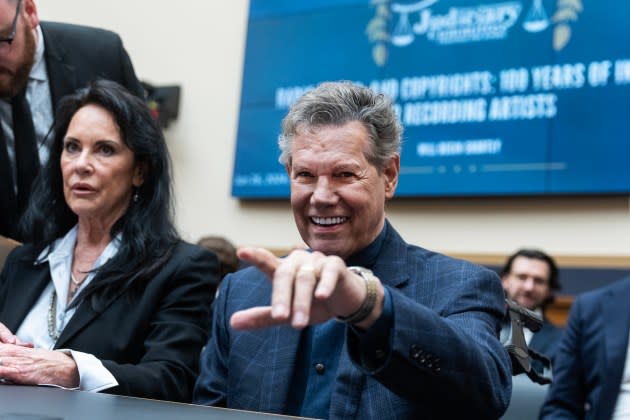Randy Travis Appears Before Congress in Support of American Music Fairness Act

Randy Travis appeared in front of a House Judiciary subcommittee hearing Wednesday to ask Congress to pass the American Music Fairness Act, a bill that would require American radio stations to pay royalties to a song’s performers.
As Randy has been unable to speak since suffering a major stroke in 2013, his wife Mary Travis testified on his behalf. “I’m kind of like a bad version of AI, but with consent,” Mary quipped at the onset, alluding (kind of) to Randy’s new song that makes use of the technology.
More from Rolling Stone
Randy Travis Is Headlining Nashville's Ryman Auditorium. What Does That Mean?
The AI Randy Travis Song Has Officially Charted at Country Radio
While songwriters have long received royalties when their music was played over American terrestrial radio, the same hasn’t been true for performers. The American Music Fairness Act aims to rectify that, Travis’ testimony stated.
“What would sheet music sound like without a voice, and what would radio sound like without a song?” Mary Travis said on behalf of her husband. “This piece of legislation is essential to correct a 100-year-old issue regarding artists and non payment for their work performed on the most prominent music platform in America, one of which they helped to build and sustain.”
Mary Travis: “It's time to do right by the ones that created that sound, that melody, that emotion that keeps the listeners coming back and the advertisers buying in to radio.” pic.twitter.com/5K1yVa3XT3
— musicFIRST (@musicFIRST) June 26, 2024
The testimony continued, “The advent of streaming has all but replaced physical records and CD sales, and there are no guarantees that listeners are running out to buy concerts and T-shirts. Folks can hear all the music they want on demand for pennies a day. Of all the things that we do differently than we did a century ago, one thing remains the same, and that is that the voice is still the mandatory bridge between the writer and the listener. It’s time to do right by the ones that created that sound, that melody, that emotion that keeps the listeners coming back and the advertisers buying into radio. Passing AMFA bill would make many old wrongs, finally, right.”
Mary Travis also discussed Randy’s recent single “Where That Came From” and its use of “artistic intelligence,” but warned of the danger posed by “terrible AI” and the need to protect “legacy artists.”
“You have the power to change this, and better sooner than later, is we are staring AI technology squarely in the face,” Mary Travis told the committee. “Artificial intelligence, and I call it artistic intelligence, because it enabled Randy to release a new song utilizing AI in its most authentic and artistic way. It’s the first song ever recorded and released with full artist consent and involvement in the studio setting… This is good AI, but there is bad, no, there’s terrible AI out there, and it’s increasing exponentially daily.”
In an op-ed published by Rolling Stone in May, rapper Master P also championed the American Music Fairness Act and lobbied Congress to pass the bill. “It’s time for change, and we all have a part to play,” he wrote. “We recently launched a new effort to help elevate the grassroots voices of artists and their allies, and ensure our voices are heard by the people with the power to finally fix this injustice. I hope you will join us. Because if enough of us speak out, I’m hopeful that our elected officials will do right by artists by passing the American Music Fairness Act into law.”
Best of Rolling Stone